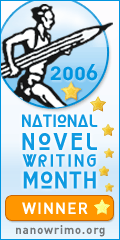Sunday, December 31, 2006
Once again at Christmas, my family supplied with me months' worth of reading, and guaranteed that those one or two books I own which, for one reason or another I've never gotten around to reading, will remain unread for another year. These include "The Great Bridge," which I'm about halfway through, and "Death in the Afternoon", which I've started a couple of times only to put it down in favor of another book. Recently, I heard an interview with humorist Joe Queenan, who claims to read several dozen books at once, and is unafraid to pick up a book he started years before and start reading again where he left off. So perhaps there is hope for me yet.
Among the books I received for Christmas (and of course Christmas also brings books via Barnes and Noble gift cards) was "Guns, Germs and Steel" by Jared Diamond and "The Godfather Returns" by Mark Winegardner. I had never planned to read the latter until I saw that it received a starred review by Publishers Weekly. I started reading it, and while the prose is clunky in spots, Winegardner does a good job developing characters and has picked up the loose threads of the original novel and movies quite nicely.
Among the books I received for Christmas (and of course Christmas also brings books via Barnes and Noble gift cards) was "Guns, Germs and Steel" by Jared Diamond and "The Godfather Returns" by Mark Winegardner. I had never planned to read the latter until I saw that it received a starred review by Publishers Weekly. I started reading it, and while the prose is clunky in spots, Winegardner does a good job developing characters and has picked up the loose threads of the original novel and movies quite nicely.
Labels: Barnes and Noble, David McCullough, Ernest Hemingway, Jared Diamond, Joe Queenan, Mark Winegardner, The Godfather
Thursday, December 14, 2006
I briefly discuss James Howard Kunstler's review of "Sprawl" at my other blog. I hope to offer my own thoughts on the book here soon.
Labels: James Howard Kunstler, Robert Bruegmann, Sprawl
Monday, December 11, 2006
Jack Shafer at Slate makes a pretty good case that Ian McEwan did indeed commit plagiarism, and is not merely guilty of laziness as I suggested in this post.
Labels: Ian McEwan, Jack Shafer, Lucilla Andrews, plagiarism, Slate
Monday, December 04, 2006
Apparently there's a bit of a broohaha in England over accusations that Ian McEwan lifted a passage from the memoir of a late British romance novelist for his novel "Atonement". The writer in question, Lucilla Andrews, was a nurse in a London hospital during World War II, as was the main character of McEwan's book.
This New York Times article notes the similarities between passages in both works:
Two British newspapers — The Mail on Sunday and The Times of London — have published excerpts that show close similarities between passages in “Atonement” and Ms. Andrews’s memoir. Mr. McEwan, for instance, wrote: “In the way of medical treatments, she had already dabbed gentian violet on ringworm, aquaflavine emulsion on a cut and painted lead lotion on a bruise.” Ms. Andrews’s book has the lines: “Our ‘nursing’ seldom involved more than dabbing gentian violent on ringworm, aquaflavine emulsion on cuts and scratches, lead lotion on bruises and sprains.”
(The New York Times ran another article about the controversy on Sunday.)
McEwan has previously acknowledged using Andrews' memoir as a source, and even mentioned it in the author's note of "Atonement." I don't think I would call what he did plagiarism, given that Andrews' book was nonfiction, and McEwan was using it to lend authenticity to his portrayal of a wartime hospital. A memoir is, however, a literary work, and McEwan probably should have taken more trouble to rework the description in question.
By the way, if you haven't read it, I highly recommend "Atonement," which is a haunting, emotionally wrenching novel. It's the only McEwan I've read, but I definitely plan to read more.
This New York Times article notes the similarities between passages in both works:
Two British newspapers — The Mail on Sunday and The Times of London — have published excerpts that show close similarities between passages in “Atonement” and Ms. Andrews’s memoir. Mr. McEwan, for instance, wrote: “In the way of medical treatments, she had already dabbed gentian violet on ringworm, aquaflavine emulsion on a cut and painted lead lotion on a bruise.” Ms. Andrews’s book has the lines: “Our ‘nursing’ seldom involved more than dabbing gentian violent on ringworm, aquaflavine emulsion on cuts and scratches, lead lotion on bruises and sprains.”
(The New York Times ran another article about the controversy on Sunday.)
McEwan has previously acknowledged using Andrews' memoir as a source, and even mentioned it in the author's note of "Atonement." I don't think I would call what he did plagiarism, given that Andrews' book was nonfiction, and McEwan was using it to lend authenticity to his portrayal of a wartime hospital. A memoir is, however, a literary work, and McEwan probably should have taken more trouble to rework the description in question.
By the way, if you haven't read it, I highly recommend "Atonement," which is a haunting, emotionally wrenching novel. It's the only McEwan I've read, but I definitely plan to read more.
Labels: Ian McEwan, Lucilla Andrews, memoir, plagiarism

